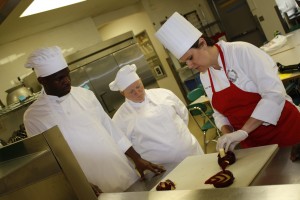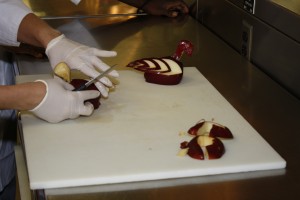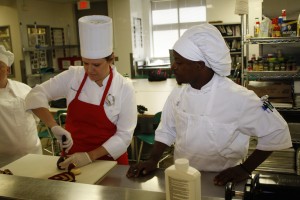By Soleman Hakeem/reporter
Culinary arts involves more than cooking shows and meal presentation.
Culinary arts is a people-oriented profession. Individuals preparing for careers in the food industry must understand that their responsibilities are likely to include daily interaction with customers and the ability to communicate effectively, said Katrina Warner, a SE Campus culinary arts instructor who has been in the profession for eight years.
Graduates leave with hands-on technical skills and supervisory and business management capabilities, Warner said.
“To be a good culinary professional, you need to have drive, professionalism, palate and dedication,” she said.

Students are taught skills in communication, food preparation, meal management, nutrition, diet, therapy and team playing.
Utilizing a kitchen in its proper way requires a strong team-player attitude and a keen insight into what ingredients work together, Warner said.
Television cooking shows are often over-dramatized and exaggerated compared to the real experience in the kitchen, Warner said.
Culinary arts students are often dietetic technicians in planning and nutrition care, preparing nutritious meals, modifying menus and managing a food service facility.
“It is imperative for individuals to be passionate about the culinary profession,” she said. “I have been in a culinary profession since I was 16 from dishwasher to hotel cooking jobs.”
Most students begin the program with courses in safety and sanitation, basic food preparation and dining room service.
For advanced cooking classes, they move into classes such as international cuisine, intermediate food preparation or advanced pastry.
Hospitality management and dietetic fields intertwine with culinary arts, so students take courses such as nutrition, purchasing, human resources, marketing and legal issues.
Upon completion of the culinary program, students can earn a two-year Associate in Applied Science degree in culinary arts or a one-year certificate of completion in culinary nutrition or food service supervision.
Being a leader and driving a team of individuals to accomplishing a goal is an important quality, Warner said.
“The TCC culinary arts department took my passion of cooking at home to help me become a professional chef and teaching me about different aspects beyond my imagination,” SE student Earl Smoak said.
After graduating, students will have the opportunity to choose a career path that expands from professional food writer, country club chef, catering chef and food stylist, Warren said.
“Students should love working with people and be passionate about food and nutrition,” SE instructor Monica Escobar said.
The importance of nutrition to prevent and treat disease and healthy foods for total fitness has raised the bar for chefs, Escobar said.
“Students should come in ready to learn, have an open mind, be confident but not overbearing and ready to work,” Warner said.





























